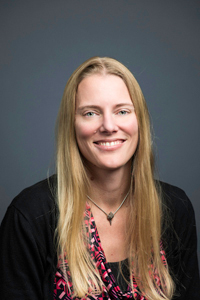
Kim de Mutsert
A George Mason University professor has received a fellowship with the National Academies of Sciences, Engineering and Medicine and will spend the next two years researching the possible effects of environmental changes to fisheries off the coast of Louisiana.
Kim de Mutsert, an assistant professor in the Department of Environmental Science and Policy and the associate director of Mason’s Potomac Environmental Research and Education Center (PEREC), was selected as a 2019 recipient of the Gulf Research Program’s Early-Career Fellowship. The $76,000 grant supports emerging scientific leaders as they “take risks on research ideas, pursue unique collaborations and build a network of colleagues who share their interest in improving offshore energy system safety and the resilience of coastal communities and ecosystems,” according to the National Academies’ press release.
De Mutsert, who earned her PhD in Oceanography and Coastal Sciences at Louisiana State University, was one of 20 scientists selected from around the nation for this year’s fellowship.
“The fellowship is to help me develop my research program and my career,” she said. “It funds people rather than the projects, so they’re investing in me. They’re providing a whole package to help me develop from a young scientist into the scientist I want to be.”
De Mutsert will work closely with Professor R. Christian Jones, the director of PEREC who will serve as her mentor, while studying what possible effects any changes in the environment or in government regulations might have upon fish populations along the Gulf Coast.
“It’s a great honor, but I’m not that surprised,” Jones said of de Mutsert. “She’s being recognized as someone who could become one of the leaders in studying estuaries and fisheries in the world.”
Using detailed computer models, de Mutsert and her team will examine numerous possible scenarios of, for example, levels of hypoxia, nutrients, temperature and salinity on fish biomass and catches before reporting their findings to local and federal government agencies.
“That’s very satisfying for me,” de Mutsert said, “knowing that some of my work could contribute to decision making.”
The Gulf Research Program was created in the wake of the criminal settlements that followed the 2010 Deepwater Horizon disaster that resulted in the largest offshore oil spill in U.S. history. An independent, science-based program, it funds grants, fellowships and other activities in the areas of research and development, education and capacity building, and monitoring and synthesis.
The program seeks to help ensure healthy ecosystems, thriving communities, safer offshore energy systems and an enhanced capacity of researchers, decision makers and communities to solve challenges that arise at the intersection of human, environmental and offshore energy systems.
Early-career research fellows can be based at any institution, as long as their work is relevant to one of the initiatives of the Gulf Research Program.
To learn more about the recipients and the Gulf Research Program’s Early-Career Research Fellowships, visit nationalacademies.org/gulf/fellowships.
